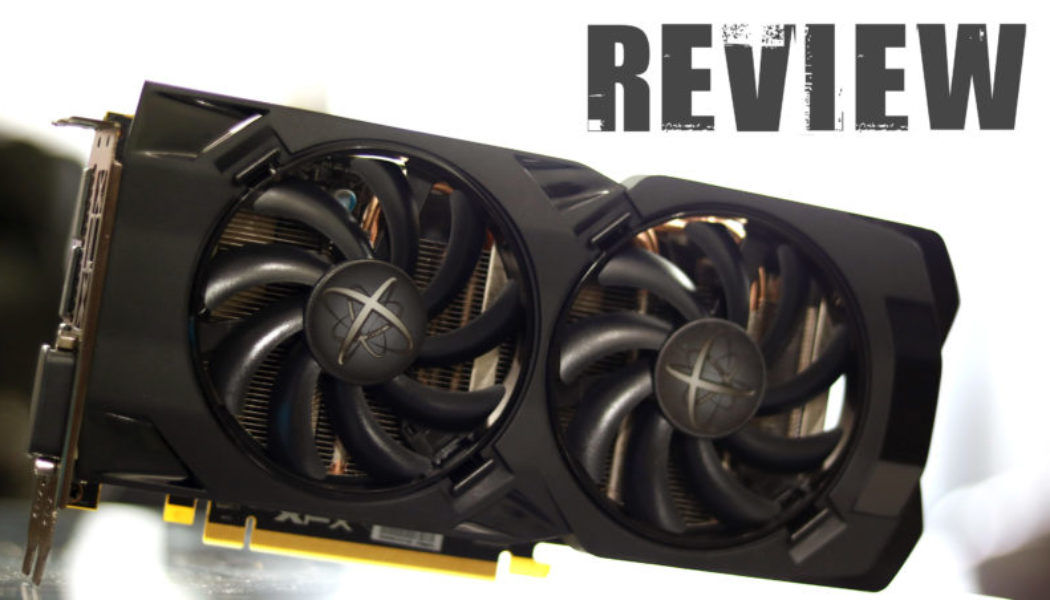Now that AMD has made its mark with the RX 480, people have their eyes on the RX 470 and want to see how the card performs. So here’s our review of the XFX RX 470 4GB Graphics Card.
Based on the same Polaris 10 architecture, the Rx 470 is a slightly nerfed version of the RX 480, and while the RX 480 was pushed out as something that provides premium VR experience on a budget, the focus for the RX 470 is unobstructed 1080p gaming.
The XFX RX 470 has a boost clock of 1256 MHz with 4GB of DDR5 memory. As there are no reference models for this card, all the RX 470s released will be custom models from the hardware partners so the clock speeds and cooling solutions can vary to a huge extent.
The graphics card features XFX’s proprietary Ghost 4.0 Thermal Technology, meaning it has three direct contact heat pipes for improved heat dissipation and new UniBody VRM construction for direct heat transfer of the power components straight to the primary heatsink for better cooling as it helps transfer heat from the card’s VRMs directly to the heatsink and heat pipes. When idle, the fans sit silent and start spinning once the load is heavy enough.
Coming with a 6-pin power connector, the card has a TDP of 120 W. XFX recommends a PSU of 500 W to be used with this RX 470. One fascinating feature is the hard swap interchangeable fans. The card comes fit with solid black fans which are held in by brackets, meaning you can replace them with a different fan should you face any problems, or want to have something with an LED customization option.
The card provides five ports for display output – three DisplayPorts, one DVI port and one HDMI port.

Now that the basics are covered, let’s dive into the numbers. The card sits at an idle temperature of about 46 degrees which is decent, while under heavy load, it stabilises at 76-77 degrees. As the card is specifically aimed at 1080p gaming, we shall only benchmark for that resolution.
DOOM is the first title that we benchmarked on the RX 470. The card’s performance is quite impressive, it gives an average framerate of 115 FPS while running on Vulkan, whereas OpenGL causes the framerate to drop to an average of 79-80 FPS.
We tested the card for Directx 11 performance using The Witcher 3: Wild Hunt. The card gives an average of 43 FPS while running on ultra settings, which is again pretty darn good.
Deus Ex: Mankind Divided was another title we tested for Directx 11 (as the support for Directx 12 hasn’t been released on for the game yet). The card struggles a bit when running the game on ultra, with an average of 37 FPS while running it on very high settings pushes the FPS up to 42-43. For a card this cheap, this is an impressive feat.
Running on Directx 12, we tested out Ashes of the Singularity on 1080p, crazy preset. The card performs decent, with an average FPS of 34.
If you don’t have a big screen and play mainly on 1080p, the RX 470 forms a perfect companion for your games, for a price point of about INR 18000-18500 /-. It gives playable framerates on most latest titles on ultra settings, but you can fine tune details according to your requirements to hit that sweet spot. You can also save a few bucks compared to the RX 480 4GB. People who are still using the R9 270 or similar cards will experience a massive boost in their performance, thus proving that now may be a good time to upgrade. When talking about games like CS:GO or DOTA 2, you can also run them smoothly on 1440p as they’re not very graphics intensive. In the end, it comes down to your budget, and the RX 470 can give you a pretty amazing Full HD gaming experience without putting a huge dent in your pocket.
For more news and reviews, keep checking back at Gaming Central.





